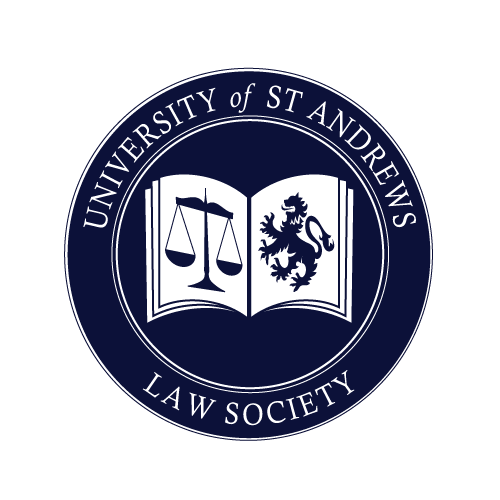HHJ Suzanne Norwood Legal Career Outreach Initiative
St Andrews University Law Society and the Institute of Constitutional Research (ILCR) hosted the inaugural HHJ Suzanne Norwood Legal Career Outreach Initiative on 14 March 2025. 41 pupils from four schools attended the event, hosted at the University of St Andrews. The ethos of the event was to encourage all considering a career in law or the legal sector to pursue those ambitions, irrespective of hurdles or challenges they may encounter.
The event is named in honour of HHJ Norwood, a St Andrews alumna, who practised at the Bar of England and Wales before sitting as Presiding Judge in the Crown Court, latterly at Middlesex Guildhall. A biography of HHJ Norwood can be found below.
The event started with a panel discussion during which contributors shared their career journeys, experiences of different practice areas, advice for those considering a career in law, and insights about various topical issues. The panel included Abby Johnstone (Trainee Solicitor at the University of St Andrews), Caroline Kelly (Deputy Chief Legal Officer and Solicitor Advocate at the University of St Andrews), Harry Potter (25 Bedford Row), Helen Watts KC (Axiom Advocates), Victoria Miyandazi (Knight Fellow in Legal and Constitutional Research, University of St Andrews). Callum Friel (Master of the Moots, University of St Andrews Law Society) and Professor John Hudson (Bishop Wardlaw Professor, University of St Andrews) moderated. A lively Q&A session followed, during which pupils in the audience posed questions to the panellists about various aspects of the law, study, and practice. Afterwards, the pupils had an opportunity to speak in small groups to the panellists during breakout sessions. Initially intended as a way to gain more insight into different areas of practice, most groups spent the time hearing stories about the more interesting aspects of life in the law!
The afternoon session was dedicated to Criminal Law, partly as a nod to HHJ Norwood’s distinguished time on the Bench. Lindsay Conchar and Marc Conchar of Scots Law Talks delivered The Guilty Mind, a fantastic and insightful workshop that asks participants to consider evil intent, reckless actions, and motive as would a jury deliberating a verdict. The audience was engaged in intense debate, intrigued by some of the peculiarities of Scots’ Law, and thoroughly enjoyed the workshop.
St Andrews Law Society and the ILCR had the privilege of welcoming David Stewart, HHJ Norwood’s son, to St Andrews for the event. The event was conceptualised and organised primarily by Callum Friel and Victoria Miyandazi; their thanks extend to everyone who supported the initiative.
Her Honour Judge Suzanne Norwood (1926-2024) was Deputy Presiding Judge at Inner London Crown Court, Presiding Judge at Isleworth, and the same at Middlesex Guildhall Crown Court. She also served on the Parole Board, the Mental Health Review Tribunal, and was President of the Medio-Legal Society. She started her career as a tenant of Three Temple Gardens, practising there for twenty years. She practised both civil and criminal law before she was appointed a criminal circuit judge in 1973, the second woman appointed to the circuit bench. She remarked in 2012 that when she started practice, there were no female ushers in
courtrooms, never mind judges; she never thought she would appear before a female judge, far less sit as one for twenty-two years.
HHJ Norwood read English and History at the University of St Andrews before she was called to the Bar by Gray’s Inn in 1952. HHJ Norwood said of this that:
It was a difficult career for women at that time, but I come from a very long line of people who believe in women’s rights, and no one was keener than my father. It was never assumed I would have a ‘little job’ to keep me going until I married. In 1952, when I was called to the bar, I quickly discovered how difficult it was. The system was male-dominated and there was much prejudice against females who were trying to get into a set of chambers. I had to fight hard for my career in those early days, but once I was established, I found that solicitors tended to be extremely faithful to their female barristers.
HHJ Norwood was of a first-class intellect: she remarkably ranked fourth in her cohort in the Bar examinations whilst working full-time as a teacher. Lord Justice Roskill of the Court of Appeal praised her in a judgment, stating that the Court would ‘pay tribute to the quality and clarity of the learned judge’s summing-up… it is, if we may be allowed to say so, a model of its kind in a highly complicated case full of difficulties.’
Her reputation as a judge is fierce and sharp-tongued: she did not hesitate to make counsel aware that they did not measure up to the standards she expected in her courtroom; her favourite demand of ‘ask a question’ lingered in the mind of many who appeared before her and attempted to make statements to witnesses.
Formidable, small in stature, and never without her famed handbag and cushion, her legacy is one of robust legal intellect and a lifelong commitment to justice.




